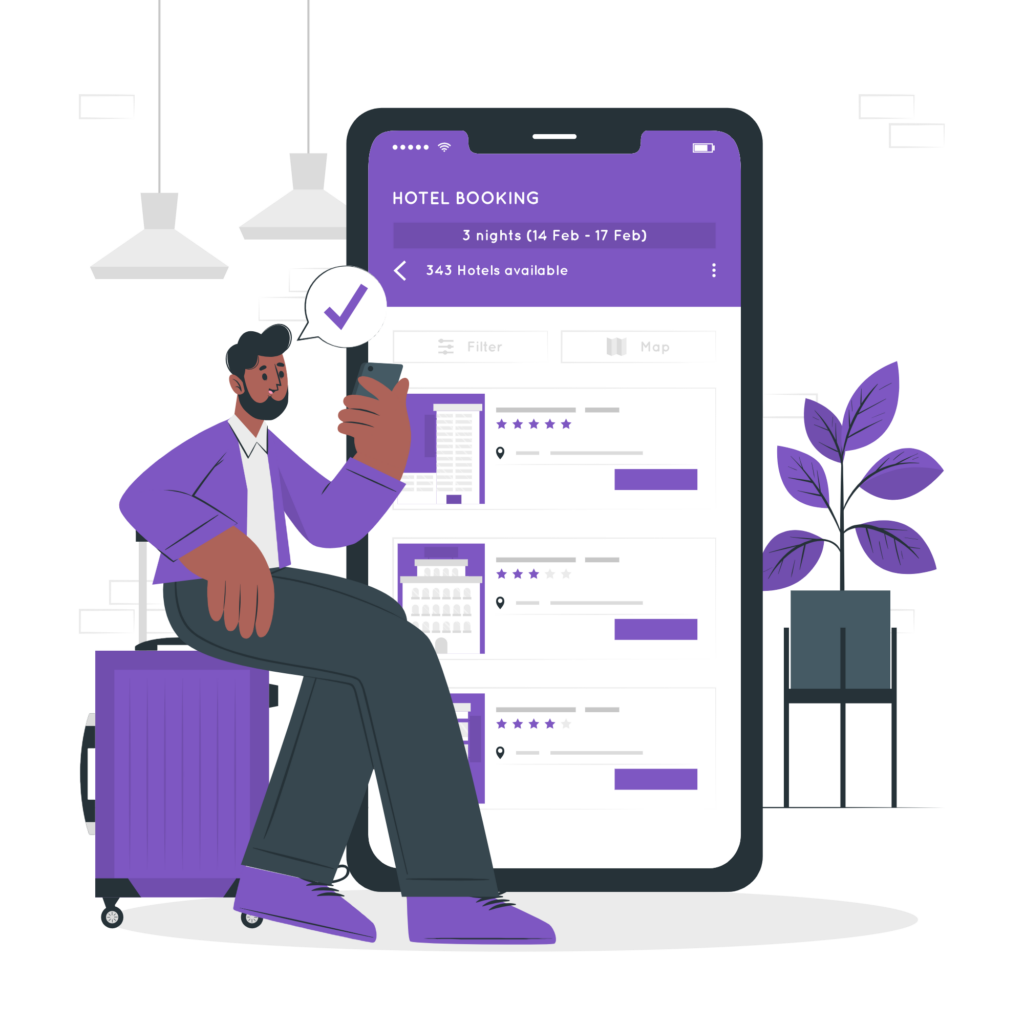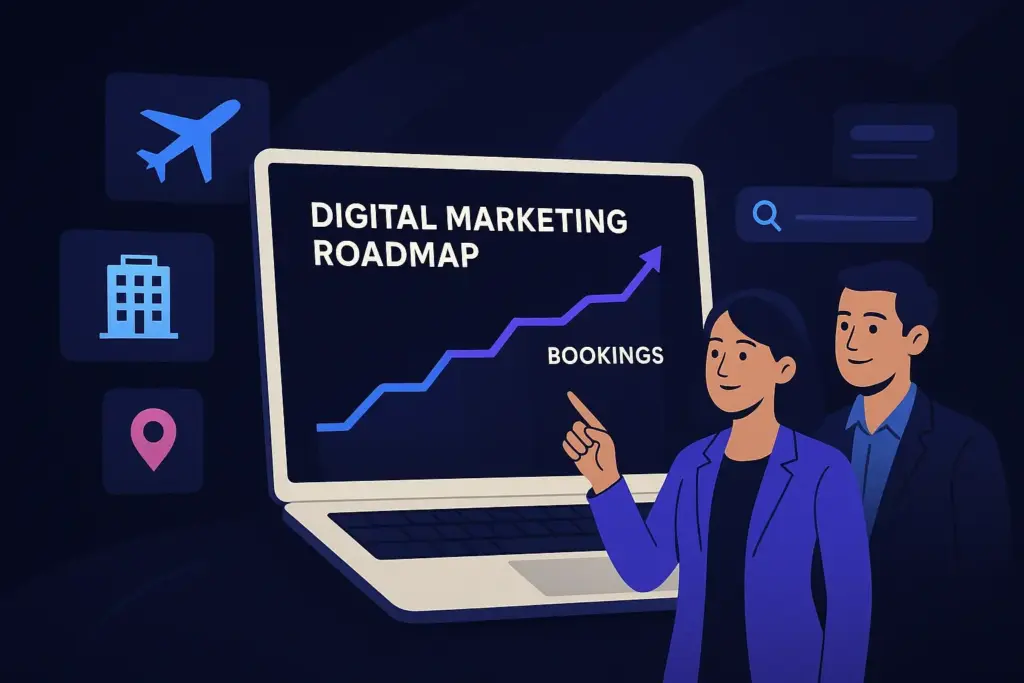Mastering Hotel SEO: A Step-by-Step Guide
Did you know the top search result on Google gets 27.6% of all clicks?
Meanwhile, the tenth result only gets 2.4%. For hotel owners, this could
mean the difference between a full hotel and empty rooms. With Google
being the top search engine, having a strong SEO strategy is crucial.
Good hotel SEO can boost your online visibility, increase bookings, and
strengthen your digital presence. This guide will cover the key steps to
excel in hotel SEO. We’ll look at keyword optimisation, content creation,
technical tweaks, and making your site user-friendly. By using these
expert tips and strategies, you can turn searchers into confirmed guests.
Key Takeaways
- Google’s top search result gets a 27.6% click-through rate, showing
how vital it is to rank high. - With an 83% market share, Google is the main search engine for
hotel SEO. - Hotel SEO includes keyword research, content optimisation, and
technical SEO. - Mobile optimisation is key, as half of all bookings are expected to be
made on mobile by 2024. - Improving page load speeds can greatly reduce bounce rates,
keeping guests on your site longer.
Understanding the Importance of Hotel SEO
In the competitive world of hotels, SEO is key. It helps your hotel be seen
online, which is crucial for getting guests. With the global hotel industry
valued at over $4.548 trillion in 2022 and over 187,000 hotels worldwide,
using SEO well is a must.
More and more, people use the internet to find and book places to stay.
Being on the first page of search results is vital to reach these people. The
move to digital marketing for hotels shows how important a strong SEO
plan is.
Studies show many things affect how high a hotel ranks on search
engines. These include SSL certificates, using the right keywords in URLs,
good backlinks, the right text length, and how long the domain has been
around. Focusing on these can help your hotel rank better.
Many small hotels prefer SEO over middlemen for booking directly on their
websites. They want more control, to save money, and to keep their brand
strong. This shows how vital it is to rank well in search engines.
Key SEO tactics like using the right keywords, creating quality content,
making websites work well on mobiles, focusing on local SEO, and getting
backlinks are recommended. These help improve your hotel’s online
visibility and make the user experience better. This strengthens your
hotel’s reputation in the industry.
Knowing your audience is also key to SEO success. Understanding who
they are, what they want, and how they travel helps make content that
draws them in. This can lead to more engagement and more bookings.
| SEO Factor | Impact on Ranking | Recommended Action |
|---|---|---|
| SSL Certificates | High | Implement SSL for secure connections |
| Relevant Keywords in URLs | Moderate | Include primary keywords in URLs |
| Quality Backlinks | High | Build backlinks from reputable sites |
| Optimal Text Length | Moderate | Ensure content meets optimal length |
| Domain Age | Low | Maintain domain over time |
How to Do SEO for Hotels
Effective SEO for hotels means making your website more visible on
search engines. It involves keyword research, on-page SEO, and technical
SEO. These steps help your site rank higher.
Keyword Research
Keyword research is key to a good SEO plan. Use tools like Google
Keyword Planner and SEMrush to find the right keywords. Look for both
broad and specific keywords to attract different types of guests.
For example, “luxury hotels London” targets a wide audience. But
“affordable family hotels near Hyde Park” might bring in guests looking for
something specific. This mix of keywords can improve your site’s appeal.
On-Page SEO
On-page SEO makes your web pages more appealing to search engines.
Add targeted keywords to headings, meta descriptions, and content. Make
sure it sounds natural and helpful to visitors.
If many people search for “pet-friendly hotels in Manchester,” include
those keywords naturally. Also, add internal links to related pages. This
helps users find more information and boosts your site’s authority.
Technical SEO
Technical SEO focuses on the behind-the-scenes aspects of your website.
It ensures your site loads quickly and works well on mobile devices. Over
50% of searches are done on mobiles, so this is key.
Good indexing helps search engines show your content correctly. Tools like
Google Search Console can spot and fix technical issues. These problems
can affect your site’s visibility and ranking.
Optimising Your Content to Enhance User Experience
In today’s competitive hospitality industry, making your content better is
key to improving user experience and making your website easy to
navigate. By creating engaging content and using well-structured meta
descriptions and headers, you can attract more potential guests and boost
your search engine rankings.
Creating Engaging Content
Creating content that grabs and keeps the attention of potential guests is
crucial. Focus on giving a full picture of what makes your hotel special and
the local attractions nearby. Talk about unique amenities, top-notch
services, and places to visit close by. Using keywords like “Best hotels in
[local city]” and “Hotel deals in [local city]” makes your content more
relevant and helps with search engine rankings, bringing more visitors to
your site.
Improving Website Navigation
Making your website easy to navigate is vital for a good user experience.
A well-organised website lets visitors quickly find what they need, like
room prices, booking options, or local spots. Use clear headings and a
logical layout in your sitemap. This makes it simple for users to move
around your site. A site that’s easy to navigate keeps users interested and
helps your SEO by showing search engines it’s user-friendly.
Utilising Meta Descriptions and Headers
Meta descriptions and headers are great for helping users and search
engines understand your site. Write meta descriptions that are short,
informative, and include key words to get more clicks from search
engines. Use headers to organise your content clearly, with H1 tags for
main keywords and H2s for secondary ones. This makes your content
easier to read and helps search engines see the structure of your
information, which can improve your site’s visibility and ranking.
| SEO Element | Optimisation Strategy | Benefits |
|---|---|---|
| Engaging Content | Highlight amenities and nearby attractions | Increases user interest and guest bookings |
| Website Navigation | Use clear headings and logical sitemaps | Enhances user experience and engagement |
| Meta Descriptions and Headers | Include targeted keywords and structured hierarchy | Improves click-through rates and search rankings |
Focusing on Local SEO for Hotels
Local SEO is key to getting more visitors to hotels, especially for those
looking for places to stay in certain areas. By focusing on local SEO for
hotels, you can boost your online visibility and draw in more potential
guests.
Google My Business Optimisation
Getting your Google My Business (GMB) profile right is essential. It’s
important to have correct and full information about your hotel to show up
in local searches. Here are some important tips:
- Make sure your hotel’s name, address, and phone number (NAP) are
the same everywhere. - Answering reviews, good or bad, shows you care and can improve
your search ranking. - Hotel SEO includes keyword research, content optimisation, and
technical SEO. - Using great photos and keeping your profile updated makes you
look trustworthy and appealing. - Tools like Semrush Local’s Listing Management can help by
automatically updating your listings for you.
Having a well-managed GMB profile really matters. Over 81% of people
check Google reviews before visiting a business, showing how crucial it is
to keep your profile engaging and current.
Leveraging Local Keywords
Using local keywords in your website content is key for showing up in local
searches. Long-tail keywords, which are more specific, are great for
catching people who are really interested in booking a stay.
Here are ways to use local keywords well:
- Add local keywords to meta descriptions, headers, and the main content to make your site more relevant to searches.
- Write about local sights, events, and amenities to draw in and inform potential guests.
- Look at data to see what search terms are popular and update your content to match.
| SEO Strategy | Benefits |
|---|---|
| Google My Business Optimisation | More visibility in local searches, builds trust with reviews, keeps info correct across platforms. |
| Leveraging Local Keywords | More bookings from specific searches, makes your site more relevant, attracts local visitors |
| Consistent NAP Information | Essential for local SEO, stops customer confusion, boosts search rankings. |
Implementing Effective Link Building Strategies
Link building is key for hotels to boost their SEO and get more visibility
online. Getting backlinks from trusted sources can make your site more
authoritative. Here are some top strategies for getting these valuable
links.
Building High-Quality Backlinks
High-quality backlinks are crucial for improving your hotel’s online image.
They come from respected websites that link back to yours, boosting your
credibility. Tools like Moz Keyword Explorer and Semrush Keyword Magic
Tool help find link opportunities.
Creating content that others want to share is the goal. Being active in
hospitality forums or events can also help get these links naturally.
Guest Blogging and Collaborations
Guest blogging is a great way to get backlinks and reach more people. By
writing for well-known sites in the hospitality field, you show your
expertise and get links. Working with influencers or other businesses can
also help your link building.
These partnerships offer backlink chances and help link your site’s pages
together. A mix of high-quality backlinks, guest blogging, and
collaborations makes your SEO efforts strong and lasting.
| Strategy | Key Actions | Tools |
|---|---|---|
| High Quality Backlinks | Create valuable content, participate in industry forums, attend events | Moz Keyword Explorer, Semrush |
| Guest Blogging | Write for reputable sites, provide informative articles | – |
| Collaborations | Partner with influencers, other businesses | – |
Conclusion
Hotel SEO combines keyword optimisation, technical skills, content
quality, and local engagement to boost online visibility. This approach
helps attract potential guests. The top result in Google gets 31.7% of all
clicks, while the last result on the first page gets only 2.2%. This shows
how crucial being in the top search results is for visibility and bookings.
Hotels can improve their SEO by doing keyword research, looking at
competitors, and using page titles, meta descriptions, and URLs wisely.
Looking at competitors can give hotels ideas for keywords to use. Long-tail
keywords are great for targeting specific guests and can lead to more
bookings.
Using AI tools like Velma and Q-SEO can also boost a hotel’s SEO. These
tools help with many languages, create FAQs, and can even help with
ranking through featured snippets. This makes the customer experience
better and can cut down on calls for simple info. Staying up to date with
these tools helps hotels stand out and attract guests in the competitive
hospitality market.




